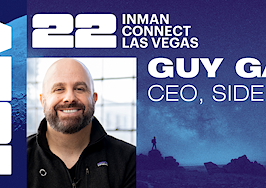Inman events are the best way to connect, learn and grow. Join us in January for Inman Connect New York, in person or virtually. Then, continue to gain insights and build your network in October at the virtual Inman Connect Now. Reserve your ticket now, prices will go up!
Side co-founder and CEO Guy Gal sees the big five brokerage brands as an evil empire that doesn’t create value for agents or consumers, and which will ultimately be defeated by a rebel alliance of boutique brands powered by his company.
Speaking at Inman Connect Las Vegas Thursday, Gal and moderator Greg Robertson of Lone Wolf Technologies riffed on the title of an earlier panel dubbed “The Empire Strikes Back,” featuring RE/MAX CEO Nick Bailey and Keller Williams President Marc King.
If “old school” brands like RE/MAX and Keller Williams are the Empire, Robertson invited Gal to describe what makes Side — which provides branding, marketing and back-end support for independent brokerages and teams — the Rebel Alliance, “and what makes you Luke Skywalker?”
Seizing on the “Star Wars” theme, Gal joked that he sees himself more as Chewbacca and Side as the Republic that’s organizing a rebellion of agent teams.
“Just to level set, the Empire in Star Wars is autocratic,” Gal said. “It’s the dark side, it’s evil, it’s Darth Vader, it’s the Death Star. They lose in the end. That’s how the movie ends — everything gets blown up. I don’t disagree with that characterization — I really do think those companies are the Empire. They are not creating real value for agents and the industry, nor consumers.”
Side, Gal said, is “looking to organize the rebellion and say, ‘Yes the future is this — it’s boutique. It’s agent-owned. It’s local. It’s about autonomy, independence and cooperation amongst different teams and different companies — not the singular control over every planet in the galaxy that have to conform to one particular point of view.'”
Gal envisions a world where “instead of having five brokerages, under which 2 million agents are subservient, thousands of local boutiques that are owned by the agents create the value in the first place, without them having to run the brokerage itself.”
Side, which seemed on track to go public last summer after achieving unicorn status and raising more than $250 million in funding, announced in June that it was laying off 10 percent of its workforce. But then in July, Side announced its expansion into six new states, bringing the total number of states where it provides services to 16.
Robertson said that there seems to be an attitude among executives at big brokerages that, “as incumbents, they just look at businesses like yours as an annoyance. How does that make you feel? Does that get you riled up, or is that a motivation?”
Gal offered a quote that he acknowledged is often misattributed to Mahatma Gandhi: “First they ignore you. Then they ridicule you. Then they fight you. Then you win.”
He said the incumbents also try to undermine the confidence of agents who are thinking about taking charge of their business and brand.
“The traditional brokerages have this amazing playbook to make you question your sanity — to institutionalize, indoctrinate the way in which you think. I’ve had a thousand conversations with different agents in the last five years about these things,” Gal said. “You can’t let them bully you, scare you, trick you, exploit you into submission. Do what you know is best for yourself, and most importantly, believe in yourself, because that’s what they want you to question — is whether or not you can be great without them.”
Many agents who have started teams “don’t want to take the next step and start a brokerage because that’s a very different business,” Gal acknowledged. “That’s not a hospitality business — it’s an infrastructure business, it’s a back office business, it’s a clerical business.”
Side, he said, “believes we can deliver that in a best-in-class way as a service, as a vendor in partnership to those teams, and let them be their own company — without having to operate a brokerage. It’s a very different approach to the industry, but in my opinion it’s the future and it’s the right approach.”
Robertson, who noted that Side is a customer of his company, Lone Wolf Technologies, asked Gal to explain the company’s philosophy of allowing agents to do whatever they want to do with their “tech stack.”
“What Side builds in a proprietary way is in contract to close, to help streamline how the transaction flows,” Gal said. “We do utilize some third-party applications in that process as well. But the way we think about Side is we’re an operating system. We’re like iOS like your iPhone. If an agent wants to go into the app store and download another application to add that to their stack, to their business, to their phone, by all means.”
Although Side does “a whole lot of work to identify the right vendors and inform the best practice stack … we never stand in their way when it comes to being creative. As long as it’s legal, as long as it’s ethical, it’s their business — they can do whatever they want with it.”
Robertson asked Gal what he would tell agents to do to prepare for the future.
“I think the future is small boutique. It’s local. It’s agent-owned. It’s a move away from generalization, to focused and specialized,” Gal said. “I think teams are at the forefront of that. So if you’re not a team yet, get on one, start one, become one. Put yourself in front of the brokerage — make sure that your clients understand that it’s you doing the work, not the brand you’re affiliated with. That it’s you creating the value.”
Editor’s note: This story has been updated to remove references to “boutique brokers.” Although Side refers to its partners as “boutique real estate companies” or “boutique firms,” the companies aren’t technically brokerages, because Side acts as their broker of record.













